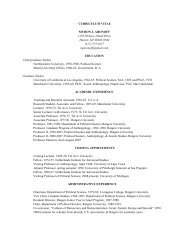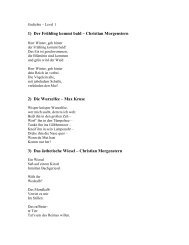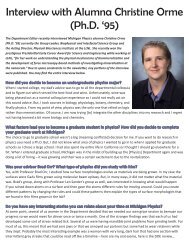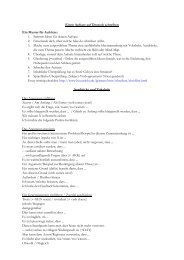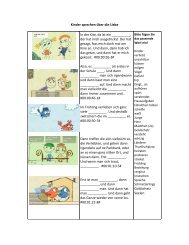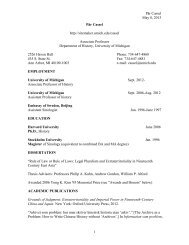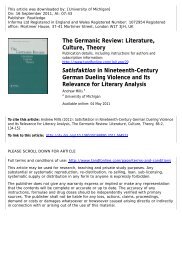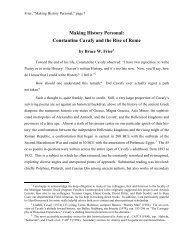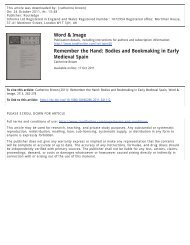BCN Worksheet - University of Michigan
BCN Worksheet - University of Michigan
BCN Worksheet - University of Michigan
You also want an ePaper? Increase the reach of your titles
YUMPU automatically turns print PDFs into web optimized ePapers that Google loves.
<strong>University</strong> <strong>of</strong> <strong>Michigan</strong> - Department <strong>of</strong> Psychology<br />
Biopsychology, Cognition and Neuroscience Concentration <strong>Worksheet</strong><br />
Effective 9/4/2012<br />
The following are Departmental requirements for the concentration in Biopsychology, Cognition, and Neuroscience<br />
Students may declare the <strong>BCN</strong> concentration once they have passed an Introductory Psychology course (with a "C" or better),<br />
Statistics, two Gateway courses and attended a Concentration Orientation. The combined GPA <strong>of</strong> these four courses must be<br />
a 2.0 or higher.<br />
Some courses that are graded “credit/no credit” may be used to satisfy the categorical requirement for a laboratory course, but<br />
do not count toward the 24 credits needed to complete the <strong>BCN</strong> concentration.<br />
Note that all courses, including pre-requisites, must be taken for a letter grade (with the exception <strong>of</strong> selected non-graded<br />
experiential labs).<br />
<strong>BCN</strong> concentrators are urged to consult with an advisor within the Department at least once per year to review their progress<br />
toward the concentration requirements.<br />
PRE-REQUISITES TO THE CONCENTRATION<br />
Complete one Introductory Psychology Course (with a "C" or better):<br />
Last Taught<br />
111 (Introduction to Psychology) Fall/Winter 1200 4<br />
112 (Introduction to Psychology as a Natural Science) Fall/Winter 480 4<br />
114 (Honors Introduction to Psychology) 4<br />
115 (Honors Introduction to Psychology as a Natural Science) 4<br />
Complete Statistics Course:<br />
Stats 250 (350) (Introduction to Statistics and Data Analysis) 4<br />
Complete three Gateway Courses:<br />
Biopsychology Gateway<br />
230 (Introduction to Biopsychology) OR Fall/Winter 300 4<br />
335 (Introduction to Animal Behavior) Fall term 225 4<br />
Cognitive Psychology Gateway<br />
240 (Introduction to Cognitive Psychology) OR Fall/Winter 425 4<br />
345 (Introduction to Human Neuropsychology) Once/Year 150 4<br />
245 (Cognitive Neuroscience) Once/Year 225 4<br />
Social Science Gateway<br />
250 (Introduction to Developmental Psychology) Fall/Winter 300 4<br />
260 (Introduction to Organizational Psychology) Once/Year 300 4<br />
270 (Introduction to Psychopathology) Fall/Winter 300 4<br />
280 (Introduction to Social Psychology) Fall/Winter 300 4<br />
290 (Introduction to Personality Psychology) Once/Year 240 4<br />
291 (Introduction to the Psychology <strong>of</strong> Women and Gender) Once/Year 120 4<br />
# <strong>of</strong><br />
Seats<br />
Credits<br />
UM-AA MHP<br />
Note: Credits from pre-requisites do not count toward the 24 required concentration credits. Courses shown below where the<br />
"Credits" column is shaded cannot be applied toward the 24 concentration credit minimum.<br />
Note: One course from each <strong>of</strong> the following three gateway groups must be completed. Courses used to satisfy the gateway<br />
course requirement may not also be used toward the advanced course requirement.<br />
Note: A total <strong>of</strong> 3 Gateway courses, one from each Group, is required. Two <strong>of</strong> the Gateway courses count toward the prerequisite<br />
requirement, and one <strong>of</strong> the Gateway courses can be counted toward the 24 credits needed to complete the <strong>BCN</strong><br />
concentration. Please fill in your third Gateway course, that will count toward the concentration requirements, on the next page.
CONCENTRATION REQUIREMENTS<br />
Gateway Requirement:<br />
Last Taught<br />
Write in the 3rd Gateway Course, listed on the previous page, used to fulfill your concentration requirements.<br />
COURSE # and NAME: 4<br />
# <strong>of</strong><br />
Seats<br />
Credits<br />
UM-AA MHP<br />
<strong>BCN</strong> Lab Requirement<br />
The lab requirement must be met in one <strong>of</strong> the following three ways for a minimum <strong>of</strong> 5 credits. Each course must be taken for at<br />
least 2 credits in a single term. Please note that at least one course must be within the Psychology Department (only one Bio-based<br />
lab may be used).<br />
Option 1: One course from A (Methods Based Labs) AND one course from B (Research Based Labs)<br />
Option 2: Two courses from A (Methods Based Labs)<br />
Option 3: One course from A (Methods Based Labs) AND two courses from either the Senior Thesis or Honors<br />
Research Sequence (Research Based Labs). Students must apply and be accepted into either the <strong>BCN</strong> Senior Thesis<br />
or Honors Program for this option.<br />
A – Methods-Based Labs<br />
303 (Research Methods in Psychology) Fall/Winter 240 3<br />
331 (Research Methods in Brain, Behavior, and Cognitive Science) by application Fall/Winter 50 4<br />
341 (Advanced Laboratory in Cognitive Psychology) Fall/Winter 25 4<br />
422 (Faculty Directed Advanced Research/Natural Science) 2-4<br />
423 (Faculty Directed Advanced Research/Upper Level Writing) 2-4<br />
Biology 226 (Animal Physiology Laboratory) 2<br />
EEB 381 (General Ecology) 5 - 6<br />
EEB 493 (Laboratory in Animal Behavior) 3<br />
MCDB 306 (Introductory Genetics Laboratory) 3<br />
MCDB 308 (Developmental Biology Laboratory) 3<br />
MCDB 423 (Introduction to Research in Cellular and Molecular Neurobiology)<br />
B – Research-Based Labs<br />
3<br />
322 (Field Practicum in Research Techniques/Natural Science)* C/NC<br />
326 (Faculty Directed Early Research for Psychology as a Natural Science) 2 - 4<br />
422 (Faculty Directed Advanced Research/Natural Science) 2 - 4<br />
423 (Faculty Directed Advanced Research/Upper Level Writing) 2 - 4<br />
428 (Senior Thesis: Research in Psychology as a Natural Science-requires 2 semesters) 3<br />
Honors Research Sequence<br />
424 (Senior Honors Research I/Natural Science) AND 2 - 4<br />
426 (Senior Honors Research II/Natural Science) 2 - 4<br />
Note: Experiential based labs that are non-graded (graded Credit/No Credit) may fulfill the categorical requirement for this lab,<br />
however, the credits do not count toward the 24 concentration credits. If credit amounts are listed next to the course, the credits<br />
may be applied to the 24 concentration credits. Students are allowed a maximum <strong>of</strong> 6 credits total toward their degree <strong>of</strong> the<br />
following courses: 322, 323, 326, 327.<br />
<strong>BCN</strong> Cognate Requirement<br />
One course from this list or a Psychology 300-400 level course (lect/sem) not on the <strong>BCN</strong> Advanced Course list (below) is required.<br />
Anthrobio 467 (Human Behavioral Ecology) 3 - 4<br />
Anthrobio 478 (568) (Primate Behavioral Ecology and Sociobiology) 3<br />
Biolchem 415 (Introduction to Biochemistry) 3<br />
Biology 208 (Embryology) 3<br />
Biology 222 (From Message to Mind: An Introduction to Neurobiology) 3<br />
Biology 225 (Principles <strong>of</strong> Animal Physiology: Lecture) 3<br />
Biology 305 (Genetics) 4<br />
MCDB 310 or 311 (Intro to Biochemistry) or Chem 351 (Fundamentals <strong>of</strong> Biochemistry) 4<br />
EEB 381 (General Ecology) 5 - 6<br />
EEB (BIO) 390 (Evolution) 3<br />
EEB 440/Environ 442/NRE 442 (Biology <strong>of</strong> Fishes) 3<br />
EEB 442 (Biology <strong>of</strong> Insects) 5<br />
EEB 450 (Biology <strong>of</strong> Amphibians and Reptiles) 5<br />
EEB 451/Environ 451/NRE 451 (Biology <strong>of</strong> Mammals) 4<br />
EEB 481 (Population Dynamics and Ecology) 4<br />
EEB 492 (Behavioral Ecology) 4 - 5<br />
EECS 281 (Data Structures and Algorithms) 4<br />
EECS 492 (Introduction to Artificial Intelligence) 4<br />
Ling 315 (Introduction to Syntax) 2 - 3<br />
Ling 514 (Semantics and Pragmatics) 3<br />
MCDB 307 (Developmental Biology) 3
MCDB 418 (Endocrinology) 3<br />
MCDB 422 (Cellular and Molecular Neurobiology) 3<br />
Phil 340 (Minds and Machines) 4<br />
Phil 345 (Language and Mind) 2 - 3<br />
Phil 450 (Philosophy <strong>of</strong> Cognition) 3<br />
Phil 482 (Philosophy <strong>of</strong> Mind) 2 - 3<br />
Stats 401 (Applied Statistical Methods II)<br />
Stats 406 (Introduction to Statistical Computing)<br />
<strong>BCN</strong> Advanced Course Requirement<br />
4<br />
4<br />
Any four courses from this pre-approved list for a minimum <strong>of</strong> 12 credits are required. Psych 230, 335, 240, or 345 may be used only<br />
if they are not used for the core requirement. Due to course size/availability, it is expected that you will take a combination <strong>of</strong> lecture<br />
and seminar based courses. This is a general guideline <strong>of</strong> when courses are taught; it is subject to change. Courses in Psychology<br />
(upper level, 300+, lecture/seminar based) not on this list may be used to satisfy Cognate requirement.<br />
Lecture Courses:<br />
230 (Introduction to Biopsychology) Fall/Winter 300 4<br />
240 (Introduction to Cognitive Psychology) Fall/Winter 425 4<br />
245 (Cognitive Neuroscience) Once/Year 225 4<br />
335 (Introduction to Animal Behavior) Fall term 225 4<br />
338 (Primate Social Behavior I) Fall term 300 4<br />
345 (Introduction to Neuropsychology) Once/Year 150 4<br />
356 (Educational Psychology) Fall term 180 4<br />
436 (Drugs <strong>of</strong> Abuse, Brain, and Behavior) Once/Year 200 3<br />
438 (Hormones and Behavior) Fall/Winter 75 3<br />
442 (Perception, Science, and Reality) Fall/Winter 60 3<br />
449 (Decision Processes) Fall term 60 3<br />
458 (Psychology <strong>of</strong> Adolescence Win term 120 3<br />
515/EPID 509 (Evolution, Behavior, and Public Health) Once/Year 50 3<br />
532 (Mammalian Reproductive Endocrinology) Win term 100 4<br />
533 (Sleep: Neurobiology, Medicine, & Society) Fall term 100 3<br />
Seminar Courses:<br />
344 (Second Language Acquisition) Win term 30 3<br />
346 (Learning and Memory) Once/Year 60 3<br />
348 (Psychology <strong>of</strong> Thinking) Once/Year 60 3<br />
349 (Talking Minds) Fall/Winter 40 3<br />
352 (Development <strong>of</strong> Language and Thought) Once/Year 30 3<br />
355 (Cognitive Development) Once/Year 30 3<br />
359 (Psychology <strong>of</strong> Aging) Occasional 30 3<br />
400 (Special Problems in Psychology as a Natural Science) Fall/Winter 40 3 - 4<br />
402 (Special Problems in Psychology) Fall/Winter 30 2 - 4<br />
413 (History <strong>of</strong> Modern Psychology) Fall term 25 3<br />
430 (Sexuality and Science) Win term 60 3<br />
431 (The Neuroscience <strong>of</strong> Attention and Attentional Disorders) Occasional 3<br />
433 (Biopsychology <strong>of</strong> Motivation) Once/Year 30 3<br />
434 (Biopsychology <strong>of</strong> Learning and Memory) Occasional 3<br />
435 (Biological Rhythms and Behavior) Occasional 3<br />
437 (Current Topics in Biopsychology) Fall/Winter 30 3<br />
439 (Behavioral Biology <strong>of</strong> Women) Occasional 4<br />
445 (Psychology <strong>of</strong> Language) Once/Year 40 3<br />
447 (Current Topics in Cognition and Cognitive Neuroscience) Fall/Winter 30 3<br />
448 (Mathematical Psychology) Occasional 3<br />
509 (Advanced Statistics for Psychology) Fall term 30 4<br />
530 (Advanced Topics in Comparative and Evolutionary Psychology) Once/Year 30 3<br />
531 (Advanced Topics in Biopsychology) Occasional 3<br />
541 (Advanced Topics in Cognition and Cognitive Neuroscience) Occasional 3<br />
Independent Study Courses:<br />
420 (Faculty Directed Advanced Tutorial Reading - Natural Science) 3 - 6<br />
Psychology GPA Requirement<br />
A student must earn a cumulative grade point average (GPA) <strong>of</strong> at least 2.0 in all courses taken within the Psychology Department. This includes any course taken<br />
in the Department such as pre-requisites, required courses, electives, and cognates (courses taken outside <strong>of</strong> psychology, but used toward the concentration or prerequisites,<br />
for example, Stats 250). Transfer courses are not calculated into the GPA unless the grade appears on the <strong>of</strong>ficial UM transcript.<br />
CALCULATING YOUR GPA<br />
Divide the total number <strong>of</strong> <strong>Michigan</strong> Semester Hours (MSH), i.e. number <strong>of</strong> credits, earned in psychology courses, and courses taken<br />
outside <strong>of</strong> the department that are used to fulfill any Psychology requirement, into the total number <strong>of</strong> <strong>Michigan</strong> Honor Points (MHP)<br />
earned from those courses. Total MHP / Total MSH = GPA<br />
Credits MHP GPA
►The following credits do not count toward the 24 concentration credits you need:<br />
▫ Introduction to Psychology<br />
▫ Two <strong>of</strong> the three required Gateway Courses<br />
▫ 100-level courses<br />
▫ 200-level elective courses (with the exception <strong>of</strong> Psych 202-natural science-based)<br />
▫ Pass/Fail or Credit/No Credit courses or labs<br />
▫ One must be a Methods Lab. This can be in the Psychology or Biology Departments.<br />
▫ Your 2 nd ►For your labs:<br />
lab may be Research-Based<br />
►Transfer courses may be applied toward your concentration, but at least 24 <strong>of</strong> your total 40 credits (includes pre-requisite and concentration credits) must be<br />
taken through the Psychology Department in Ann Arbor. Of those 24 in-house credits, at least 12 credits must be in upper level courses (300+, letter graded) in<br />
Psychology.<br />
►Registration Tip: If courses are closed:<br />
▫ Watch Wolverine Access for openings and/or waitlists<br />
▫ Attend first day <strong>of</strong> class<br />
►Calculating <strong>BCN</strong> Grade Point Average: GPA=MHP/MSH – Include all Psych department courses and any cognates or courses from other departments<br />
counting toward your concentration (e.g., your cognate). This includes the Intro Psych, any first year seminars, extra breadth courses, psychology courses that<br />
have been repeated or failed, and any other graded psychology courses. *You must have an overall concentration GPA <strong>of</strong> at least 2.0 in order to graduate!<br />
►Middle Digit Trick: The middle digit <strong>of</strong> Psychology Department undergraduate courses indicates the area <strong>of</strong> Psych with which the course is associated:<br />
0, 1, 2=General<br />
3=Biopsychology<br />
4=Cognitive<br />
5=Developmental<br />
6=Organizational<br />
7=Clinical<br />
8=Social<br />
9=Personality<br />
<strong>BCN</strong> CONCENTRATION QUICK FACTS<br />
►The core courses consist <strong>of</strong> one Biopsychology and one Cognitive Psychology course. Notice that all four <strong>of</strong> these courses are listed under Advanced<br />
Courses as well. The courses you do not use toward the core requirement may be elected to count toward the advanced courses. You can only use each<br />
course once, either toward the core requirement or the advanced course requirement.<br />
►Credits from your Statistics course do not count toward the 24. We recommend that you take Stats early in your coursework since it is a pre-requisite for<br />
methods-based labs and several <strong>of</strong> the gateway (Core) courses.<br />
Note: Your two lab courses combined must total at least 5 credits and must be taken for at least 2 credits each. Only one Biology-based lab may count toward<br />
the BBCS concentration. Credit/No Credit experiential labs will fulfill the categorical requirement for a second lab, but the credits will not count toward the 24<br />
concentration credits. They do count toward the LSA 120 required for a BA or BS degree.<br />
►Advanced Elective Credits must be letter graded Psychology courses from the pre-approved list. You will need to take at least 4 courses for a minimum <strong>of</strong><br />
12 credits.<br />
►Get involved in Research! If you are planning on attending any type <strong>of</strong> graduate program, especially within the field <strong>of</strong> Psychology, you will need research<br />
experience. You can do this for research-based lab credit. Please see the Psychology Student Academic Affairs Office for more information.<br />
See an advisor at least once a year to review your progress!






